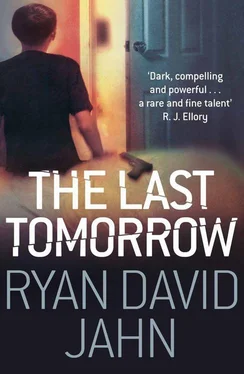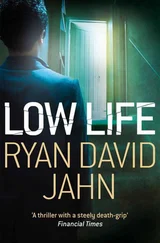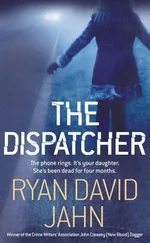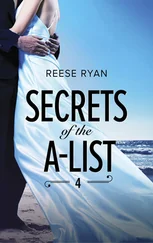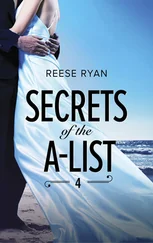Ryan Jahn - The Last Tomorrow
Здесь есть возможность читать онлайн «Ryan Jahn - The Last Tomorrow» весь текст электронной книги совершенно бесплатно (целиком полную версию без сокращений). В некоторых случаях можно слушать аудио, скачать через торрент в формате fb2 и присутствует краткое содержание. Год выпуска: 2012, ISBN: 2012, Издательство: Macmillan Publishers UK, Жанр: Триллер, на английском языке. Описание произведения, (предисловие) а так же отзывы посетителей доступны на портале библиотеки ЛибКат.
- Название:The Last Tomorrow
- Автор:
- Издательство:Macmillan Publishers UK
- Жанр:
- Год:2012
- ISBN:9780230766501
- Рейтинг книги:4 / 5. Голосов: 1
-
Избранное:Добавить в избранное
- Отзывы:
-
Ваша оценка:
- 80
- 1
- 2
- 3
- 4
- 5
The Last Tomorrow: краткое содержание, описание и аннотация
Предлагаем к чтению аннотацию, описание, краткое содержание или предисловие (зависит от того, что написал сам автор книги «The Last Tomorrow»). Если вы не нашли необходимую информацию о книге — напишите в комментариях, мы постараемся отыскать её.
The Last Tomorrow — читать онлайн бесплатно полную книгу (весь текст) целиком
Ниже представлен текст книги, разбитый по страницам. Система сохранения места последней прочитанной страницы, позволяет с удобством читать онлайн бесплатно книгу «The Last Tomorrow», без необходимости каждый раз заново искать на чём Вы остановились. Поставьте закладку, и сможете в любой момент перейти на страницу, на которой закончили чтение.
Интервал:
Закладка:
Eugene stood silent, unable to believe what he’d just heard. He made a dollar twenty-five an hour doing construction — ten greenbacks a day — and this man had just off-handedly offered him hundreds.
‘Do we have a deal?’
Eugene simply nodded.
‘Good.’
He had his own comic book within six months. He wrote every story. He had notebooks full of ideas and was always adding more while refining the ones he’d already jotted down. Once each month’s stories were decided upon, Leonard would assign them to various artists. Eugene would draw one himself and oversee the completion of the rest. It was a productive, creative time.
Then the kids started to get tired of superhero comics.
Circulation dropped fast.
The last issue of Rabid! ran in April 1943.
As the superhero comics were sinking, crime comics were rising. Eugene stayed on at E.M. Comics to write and draw for Gutterguns , an anthology comic about lowlife criminals. He handled a story a month for a couple years, making enough to get by on, but not much more. Making less than he had in construction.
This was not the escape from poverty he’d imagined it would be.
In 1945, feeling depressed and creatively stifled by working on other people’s projects, he told Leonard he wanted to do a comic book of his own again. It would be a crime comic, but one that allowed him to stretch himself a bit. Every story would be set in a fictional place called Down City, where dark things were always happening. Criminals ran the place. Albino alligators survived in the sewers, living off the bodies of those unfortunate enough to have crossed the wrong mobster — or the corrupt police department. Each story would reference something that happened in another story, would reveal a previously undisclosed connection, until there was a network of fiction so elaborate that Down City seemed real, seemed a three-dimensional place that a person could step into.
The first issue ran in August 1945. The last issue ran in December 1949. It was never the most popular comic E.M. published, but it was a good run all the same, and Eugene managed to accomplish some of what he’d wanted to accomplish when he began. He’d even seen adults reading his work. Those were proud moments, moments when he felt he’d actually done something worth doing.
But by 1949 he’d been in the business eleven years. He was thirty-eight and he was tired of comics. He decided he wasn’t going to do them anymore. The quiet pride he sometimes felt wasn’t enough.
He had a little money saved. After eleven years of work in comics he had accumulated enough cash to keep himself out of the poorhouse for six months, assuming he was very careful, and if he really committed himself to it he thought six months might give him enough time to write a novel.
He’d come out here from Kentucky to make it as a writer, to make it as a novelist, but had not yet written a single book. Not even a bad one. He’d written a few dozen short stories, published six or seven of them, but he was still on page twenty-nine of the novel he’d begun in 1936. He wasn’t even sure where the manuscript might be. He hadn’t seen it since he moved apartments in 1947.
His eleven years in comics now felt like they’d been wasted, like they’d distracted him from what he really should have been doing. He’d made no money and the art he produced, if it could be considered art, ended up getting tossed into trashcans by bedroom-cleaning mothers and Sunday-school teachers. He could stay and continue to turn out tomorrow’s trash for twenty dollars a page, or he could do what he should have been doing all along.
But he didn’t think he could do it in New York. He needed a change of environment, a change of scenery. He decided to go to Los Angeles. He liked the idea of getting as far from New York as he could without first obtaining a passport. He would go to Los Angeles and he would live off his savings and he would write a novel. He would throw out his twenty-nine pages and start a new novel in a new place. He’d sit on a sun-lit porch or on the verge of a hotel pool with a portable typewriter on his knees and write a novel while sipping rum cocktails. And he wouldn’t go back to New York till it was finished.
That was his plan.
And a week later he stepped off a train in downtown Los Angeles, with a cardboard suitcase gripped in his fist and a small fold of cash in his pocket. He was in his new place and his future seemed bright.
But things didn’t go according to plan.
In two and a half years he has written not a single word unless the paper it’s typed upon has been promptly crumpled into a tight ball and thrown into a trashcan.
He still pulls out his typewriter after work sometimes and rolls in a sheet of paper, especially when he’s been drinking. But then he simply sits and stares. The blank page is somehow intimidating. He knows what he wants to put on it — it’s clear in his mind — but it won’t come. Something in him won’t let it out.
With comics it was easy. It didn’t feel like it mattered. He didn’t even sign most of his work. It was creative, sometimes he did something he was proud of, but in the back of his mind he knew it didn’t mean anything. He’d never sent a comic book home to Kentucky as he had the short stories he’d published. He’d never even told his father he was working in comics. Comics were disposable. No matter how good they were, they were trash. There was something creatively liberating about that. If what you do doesn’t matter, you can do anything. But this matters. This is his dream. And he knows that as soon as he slams his fingers against those typewriter keys, as soon as he commits to certain words in a certain order, he will have tarnished his dream.
He can’t bring himself to do that.
It’s better to wait.
Someday the right words will come and he’ll know they’re the right words because he’s been waiting on them for so long. When the time arrives he’ll sit down and write his novel. He will do what he’s always said he’d do.
Until then, he’ll be a milkman.
3
He makes a right onto Wilshire, heading east. The street is empty but for him, and its emptiness makes it lonesome. Like a dry riverbed, it feels almost sad. This isn’t how it was supposed to be. It was built for so much more. But he likes that feeling. He likes it because he knows it’s temporary.
This isn’t failure; it’s potential.
He rolls down the empty street, makes a few turns onto other empty streets, and finally pulls into an alleyway, driving along the backs of anonymous warehouses. Trash bins line the alleyway. Tractor trailers parked at docks. Homeless men with newspaper blankets. Then he arrives, rolls past a steep ramp, slams the truck into reverse, and backs up the incline, ignoring the engine’s high-pitched whine. He brings the truck to a stop, kills the engine, and steps out of it with a clipboard in hand.
The warehouse guys are sitting at a rickety table playing cards.
Once trailers are unloaded and product is inventoried and stocked, the warehouse crew merely wait around for milkmen like him to arrive so the day’s orders can be pulled and loaded. Then, after all the trucks are on their way, they sweep, check inventory once more, and shut the place down. By eight o’clock they’re headed home to sleep, or to a bar to toss back a few.
‘Eugene,’ says the warehouse foreman, Darryl ‘Fingers’ Castor, looking up from a fan of cards. ‘How’s the novel coming along?’
‘Slow and steady. What about last night’s gig?’
‘It was sweet, man. You should’ve been there.’
Fingers drives down to 57th Street every Saturday night to play trumpet, the only speck of white in a six-piece Negro bebop band. Eugene’s gone out to see them several times now. He was nervous, and got a few stares, the first time he showed up at the club where they play, but things loosened up once everyone realized he and Fingers were friends, and he ended up having a hell of a good time. Now when he goes, rare as that is, the regulars know him by name. He even took a date once.
Читать дальшеИнтервал:
Закладка:
Похожие книги на «The Last Tomorrow»
Представляем Вашему вниманию похожие книги на «The Last Tomorrow» списком для выбора. Мы отобрали схожую по названию и смыслу литературу в надежде предоставить читателям больше вариантов отыскать новые, интересные, ещё непрочитанные произведения.
Обсуждение, отзывы о книге «The Last Tomorrow» и просто собственные мнения читателей. Оставьте ваши комментарии, напишите, что Вы думаете о произведении, его смысле или главных героях. Укажите что конкретно понравилось, а что нет, и почему Вы так считаете.
